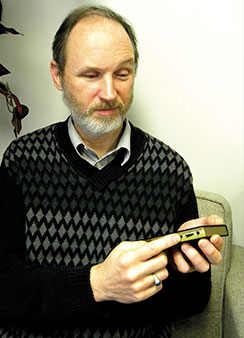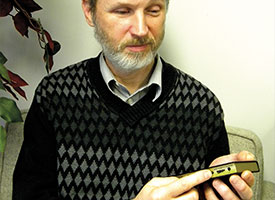By Melanie Ave
Bob Heiser’s Bible study group at Pilgrim Lutheran Church in Green Bay, Wis., was working its way through the book of Revelation when he brought along his new electronic Talking Bible to share with everyone.

“I set it on Chapter 12 and let it read for the class,” said Heiser, who is visually impaired. “They were very impressed.”
Heiser is just one of 725 people to receive digital audio Bibles distributed through the former Lutheran Blind Mission in the last year thanks to a $35,000 grant from the Synod’s Office of National Mission. St. Louis-based Lutheran Blind Mission (LBM) and Lutheran Braille Workers (LBW) in Yucaipa, Calif., both LCMS Recognized Service Organizations, merged in 2012 and combined ministries under the LBW name.
The “blind-friendly” Bibles were disseminated through 65 outreach centers nationwide for people who are blind or have low vision, said the Rev. Dave Andrus, director of Christian outreach for LBW.
Besides braille Bibles, the LBW produces Lutheran Service Book and other congregation-based materials in braille and large print, and oversees the outreach centers where people meet regularly for fellowship, training and worship.
Since the merger, LBW is now the largest ministry of its kind in the world, serving more than 1,500 people with visual impairments in the United States and Canada at the outreach centers, supplying thousands of people throughout the world with the Bible in braille and large print (in 30 languages), and providing 4,000 people in the United States with magazines and devotionals. It also maintains the largest Christian library in the world for people who are blind.
“The grant was an answer to prayer, both by me and many people at the outreach centers” for the audio Bibles, Andrus said. “We purchased a few, field-tested them and found them perfect for our people.”
The audio Bibles were an important tool to reach the visually impaired with the Gospel, Andrus said.
“We know many blind people cannot read braille,” said the Rev. Bart Day, executive director of the LCMS Office of National Mission. “They are all too often disconnected from churches. Audio Bibles are key for them.”
While showing a demonstration model of the Bible in Sioux City, Iowa, Andrus said a man named Jim refused to pass the device to others or even turn it off.
“He listened and listened,” Andrus said. “He was so absorbed with hearing God’s Word. He wanted more and when told it was time to go, he was sad. He was so glad to receive his own audio Bible sent to him in the mail.”
Andrus said he has received many words of thanks from people who have received the Bibles.
“God does work miracles,” Andrus said. “We are hearing from many who are blind and visually impaired at the outreach centers that they did not have a reasonably accessible Bible. Because the outreach centers have been connecting with people who are blind and wanting to know God and read His Word, a blind-friendly audio Bible was needed to help them.”
Heiser said he uses the Talking Bible in two different Bible studies in which he participates. He connects his headphones into the Bible and follows along with the Scripture as the other Bible study group members read from printed Bibles. “I am experiencing a lot of spiritual growth,” he said.
One recipient of an audio Bible sent a phone message of thanks to Andrus that said, in part: “I truly cannot tell you how much I appreciate it. Sometimes I simply turn it on and just sort of cuddle down and listen. It’s nice because someone is reading to me like the reading hour we used to have as children.”
The mission of the LBW is to reach people who are blind or visually impaired throughout the world with the message of Jesus Christ.
The audio Bibles are just one of the many ways LBW carries out its mission. The hand-held Bibles – which are in the English Standard Version of Scripture – are similar to MP3 players. They are about the size of Luther’s Small Catechism. The devices have buttons on the side to help users navigate through the Scriptures. They also come with a high-quality speaker.
The LBW worked with Crossways International to get a human recording on the devices, which Andrus said is easier to understand than a synthesized sound.
LBW will soon mail the first issue of what will be a 24-month audio Bible study to be used with the audio Bible, Andrus said. The first three months of the study have been completed and three additional months are “deep into production,” he said.
The Bible study will eventually be available for free on CD on the Lutheran Braille Workers website at lbwinc.org or by calling 800-925-6092.
The Bible study is Concordia Publishing House’s Today’s Light, which has been modified for people with visual impairments.
“We changed the earthly examples to reflect their life situations and experiences,” Andrus said. “We also each week have added a section that deals specifically with blindness and low vision.”
The LCMS grant for the audio Bibles came from Fan into Flame — the campaign to support the Synod’s Ablaze! mission-outreach initiative. The funds were earmarked for “Faith Comes by Hearing” projects, which also included funding more than 55,000 “BibleStick” MP3 players for 24,000 youth at the 2007 National LCMS Youth Gathering; 31,000 LCMS students in Grades 1-8; and all LCMS chaplains and career missionaries. The “BibleStick” is a dedicated audio device that comes preloaded with a dramatized audio version of the New Testament.
Melanie Ave is senior writer and social media coordinator for LCMS Communications.

